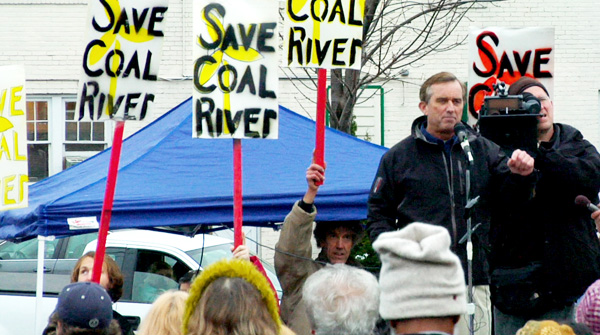|
Reviews of Recent Independent, Foreign, & Documentary Films in Theaters and DVD/Home Video

THE LAST MOUNTAIN The Last Mountain is an issue documentary, though unlike a number of these films, it isn’t simply content to propagandize, but instead, like a skilled debater, it offers a credible argument. Arguments proceed by advancing a number of propositions that, if well reasoned, lead inexorably toward a well-founded conclusion. They also anticipate possible objections and offer counterarguments before their opponents, essentially, cut them off at the pass. Instead of offering a line of reasoning, many filmmakers simply try to carve out a narrative for the viewer to follow in the hopes that the story will draw the audience in and convince them of the rightness of the director’s point of view. What may be overlooked by these films is that a well-reasoned argument is compelling in its own right, and as The Last Mountain demonstrates, can take over for the narrative and still offer the viewer a dramatic framework. Director Bill Haney’s reasoning is as such: mountaintop removal mining is 1) environmentally destructive to the land 2) physically destructive as the contaminants given off by extracting coal are a health hazard and 3) culturally destructive as the mining industry destroys communities and existing ways of life. Meanwhile, there are alternative, renewable sources of energy (namely wind power) that are not as environmentally, physically, or culturally dangerous, and which offer comparable benefits. Therefore, we should stop mining coal, or at least, lessen our dependence on coal and begin to build wind farms to power our society in the future. Laid out like this, the argument seems both stale and obvious, which is why verbal arguments barely move anyone to action. Haney wisely instantiates these points, giving them life and truth by examining the plight of Appalachian communities affected by mountaintop coal mining and the death and destruction that result. With environmental lawyer and activist Robert Kennedy Jr. as the Virgil of the piece, the viewer is guided through the environmental and human impact of coal. While the villains, so to speak, are certainly the coal companies—especially Massey Energy—Haney doesn’t shy away implicating the viewer, as a consumer of energy, in the destruction. The truth of the matter, though, is that it isn’t easy to suss out the practical repercussions: what one ought to do. Haney and the environmental movement have a particularly compelling argument, and even if they didn’t, they look particularly angelic in comparison to their opposition, which on its face is mostly composed of greedy monsters or shills. However, as Bill Raney, the president of the West Virginia Coal Association, asks: where is the energy going to come from if we stop mining coal? He also wants to know, how can we keep everyone in the mining industry employed if coal production is abandoned? How do we maintain jobs during a period that is perhaps as turbulent as the Great Depression? Haney’s counterargument is that wind power will provide clean energy and jobs and that there are already working wind farms that prove this. It’s a good answer and certainly siding with the coal industry completely is utterly morally objectionable, but Haney’s questions are worth considering. What the documentary never touches on, however, is how exactly are we supposed to transition to this new power source. Of course, that may be completely outside the film’s scope, but it’s worth pondering.
Certainly, the core of Haney’s argument is right—coal is
dangerous and we should be exploring other alternatives. If there is a
downside to the film, it’s that it buys into the original premises that
allowed the coal industry to form in the first place: 1) the answer to
our energy problems must have a capitalist solution that preserves
profit and 2) we need to preserve our energy consuming culture exactly
as it is and just replace the energy source. Wind is certainly a great
idea. Why it has to be an industry following the dictates of capitalist
logic is an assumption of everyone involved—there may be alternatives to
that outside of the standard framework. As well, maybe our way of life
isn’t worth preserving as it is. Maybe it desperately needs to undergo a
transformation to a simpler way of life. Again, maybe this falls outside
of the boundaries of the film, but they are questions certainly worth
thinking about while watching Haney’s compelling film.
Andrew Beckerman
|

